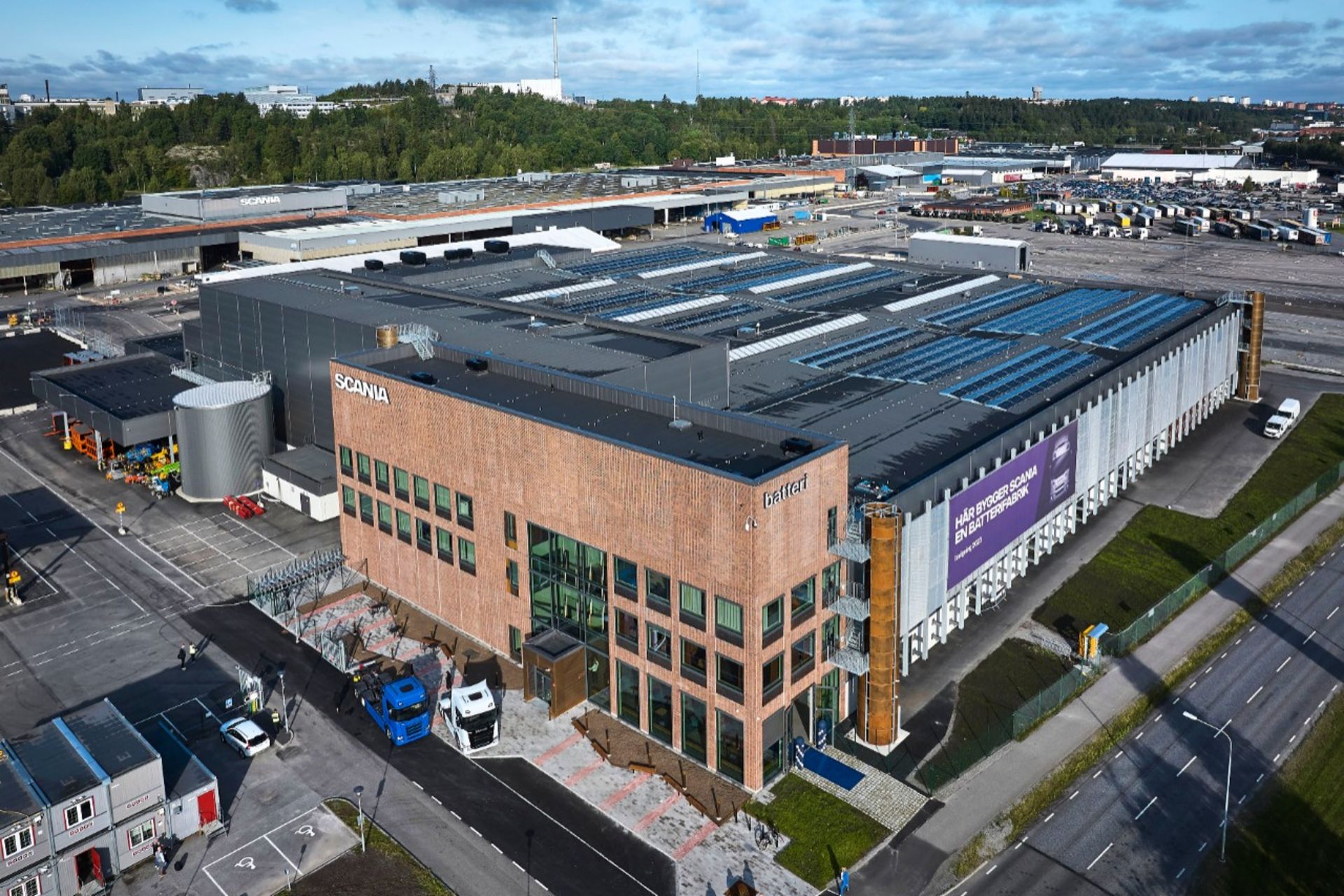Imagine the harshness of a world without transportation. In this reality, supermarket shelves remain barren, and the vibrant hum of a global industry has been silenced. Transportation, the cornerstone of our interconnected world, grinds to a halt, bringing the wheels of commerce and trade to a complete stop. Once dynamic, interconnected cities would be starved of vital supplies in the absence of logistical infrastructure.
While this vision is undoubtedly a harrowing one, we needn’t envision a future without logistics. We do, however, need to consider – and build – an emission-free logistics ecosystem if we are to leave a healthy world for future generations. New technologies are accelerating this transition, and although some challenges remain, the TRATON GROUP is actively working to deliver solutions.
.png)
Powering a sustainable world through electrification
Rising demand for eco-friendly transportation has highlighted the importance of electrification within the industry. The transition to battery electric vehicles (BEVs) supports environmental objectives, presenting companies with the opportunity to take the lead in shaping a more sustainable future. The commercial opportunities for operators are also hugely enticing.
However, the electrification journey is facing several challenges. One of the biggest factors is insufficient charging infrastructure, particularly in terms of high-performance fast-charging facilities for heavy-duty commercial vehicles. In addition, the complexity of navigating a range of emissions standards for both diesel and zero-emission vehicles across global markets presents additional hurdles, as it requires investment in both old and new technologies.
Beyond these factors, the current supplier and production network must undergo adjustments to accommodate the mass production of BEVs, and sales and service capabilities must align with the evolving reality.

TRATON recognizes the opportunities presented by electrification and is strategically investing in its battery-electric product portfolio. This also brings investments in new facilities like Scania’s new battery assembly plant, while MAN Truck & Bus will manufacture up to 100,000 battery packs per year at its Nuremberg site from 2025 onwards.
The TRATON GROUP is advancing in its brands’ products as well. Scania has been a key player in advancing electric trucks and buses, emphasizing sustainable transport solutions, and offering hybrid alternatives for improved fuel efficiency. In October 2023, the Company introduced major updates for its urban BEV solutions, with e-adapted chassis, new batteries and optimized auxiliary systems. Meanwhile, MAN has developed the Lion’s City E electric bus, which is tailored for urban people transport, and production of its eTGX for long-haul transport will start in 2024. And with the e-Delivery, Volkswagen Truck & Bus (VWTB) offers the first 100% electric truck that has been produced in Latin America.
These examples already show how the Group is positioning itself to play a pivotal role in the transition to a fossil free world. Addressing the challenge of charging infrastructure, TRATON is actively investing in this through the joint venture Milence – which is focusing on high-end Megawatt Charging System (MCS) chargers for long-haul heavy-duty trucks and coaches traversing Europe – to facilitate the widespread adoption of electric commercial vehicles. The Company is confident in embracing the shift to electric transportation, citing substantial energy cost savings that can ultimately deliver benefits to customers.
“We’re investing billions into our electrification efforts and plan to sell the majority of our trucks beyond 2030 as fully electric vehicles, wherever the infrastructure allows for it. We have already rolled out our last major diesel engine. We are investing heavily in charging infrastructure and charging services,” explains Andreas Kammel, who is responsible for TRATON’s strategy regarding Alternative Drivetrains.
The digital disruption: Navigating the data highway
The increasing importance of digital technologies presents a significant opportunity for new business models and solutions for customers. Companies that embrace digitalization can harness the power of real-time data to optimize fleet and transport management, monitor and improve vehicle performance, and contribute to broader industry advancements.
“We’re seeing a shift in focus towards digitalization and software – areas that are not traditionally our core competencies. Therefore, we must investigate potential partnerships with companies that are strong in these areas,” explains Malte Schmitz, Head of Strategy and Business Operations in the TRATON GROUP.
Autonomous driving: Paving the way to efficiency
The global move towards electrification converges with the prospect of autonomous driving, promising increased efficiency and safety in freight mobility. Autonomous trucks, once integrated into regular operations, have the potential to revolutionize the industry by reducing operating costs and enhancing overall efficiency and safety. Moreover, the integration of autonomous driving technology also stands as a promising solution to the ongoing challenge of driver shortages.
Before widespread autonomous driving truly becomes a reality, the industry must overcome a number of challenges, including the complexity of achieving full autonomy and the recalibration of initial timelines. The industry has witnessed a reassessment of expectations, emphasizing the intricate nature of achieving autonomous driving and the need for extensive testing.
TRATON and its brands are already preparing for this new age of transportation. “We are developing our system as one joint team to create customized customer solutions with a modular approach for all brands within the TRATON GROUP,” says Peter Hafmar, Vice President and Head of Autonomous Solutions at Scania. In this role, he is responsible for coordinating autonomous solutions within the Group.
There are several activities ongoing within the on-road segment. Scania has been driving daily autonomous tests on public highways since 2021, transporting both internal and customer goods. These tests have contributed to the improvement of logistical flows as well as data collection, which will increase the speed of future development.
In the ATLAS-L4 sponsorship project, MAN and twelve partners have achieved key milestones towards the development of self-driving trucks for hub-to-hub automation on German highways. Practical testing on the highway is planned for 2024, with the project aiming to address driver shortages, improve efficiency, and enhance road safety.
In the field of confined spaces, there have been several successful projects across the Group. In Ulm, the ANITA (Autonomous Innovation in Terminal Operations) project, led by MAN and its partners, successfully developed and tested the use of self-driving trucks in a container terminal. The autonomous MAN TGX 18.510 truck, equipped with state-of-the-art sensor technology, demonstrated fully automated actions, achieving project goals and suggesting a 40% efficiency potential in freight handling.
Scania and Rio Tinto have established a long-term research and development collaboration to continually advance autonomous technology. Under this partnership, Rio Tinto's Channar mine became the first active partner site for Scania’s autonomous mining solution. The new trials on Scania’s 40-ton-payload autonomous mining trucks were launched by Rio Tinto and Scania, swiftly achieving a key milestone: driverless operation.
In addition, VWTB is testing autonomous technology to be used by harvesters in fields and sugarcane crops in São Paulo.
These examples highlight TRATON’s commitment to advancing autonomous technology. By engaging in real-world testing and collaborative efforts, the Company is actively contributing to the realization of autonomous driving within the commercial vehicle industry.
The Group’s efforts are gaining recognition; MAN’s autonomous truck trials have been so successful, that they contributed towards the company receiving the ‘Truck Innovation Award 2024’ from the International Truck of the Year jury. The accolade recognizes MAN’s ANITA and ATLAS-L4 autonomous trucks projects.
“I envision autonomous driving will become an important asset for transportation across the globe in the upcoming decades. However, I am cautious in predicting when exactly we will see a significant ramp-up of autonomous operations,” says Schmitz.
A transformative shift in business models
“When you look at electrification, digitalization, and autonomy, what becomes clear is that the entire industry will need to evolve their business models to accommodate these trends. In the dynamic European truck market, characterized by its fragmentation and where the average carrier typically owns only about seven trucks, a new set of risks is emerging alongside the ongoing trends. It is crucial for us to assist carriers in effectively managing and navigating these challenges. Turning our attention to handling these risks not only safeguards against potential pitfalls but also presents an opportunity for us to provide valuable support,” explains Gustaf Sundell, Executive Vice President and Head of Ventures and New Business at Scania.
“When you look at electrification, digitalization, and autonomy, what becomes clear is that the entire industry will need to evolve their business models to accommodate these trends.”
Gustaf Sundell Executive Vice President and Head of Ventures and New Business at Scania
He recently announced a joint venture (JV) for Scania with sennder. The new Berlin-based company called JUNA will introduce an innovative pay-per-use model for electric trucks, together with a utilization guarantee. The pricing includes access to Scania electric vehicles, repair, maintenance, insurance, digital and analytics services. The ambition is that JUNA will clear the way for the large-scale adoption of electric vehicles by removing the obstacles currently hindering the industry. These include high upfront costs, residual value, and technology risks. In return, the JV will provide commercial predictability through guaranteed incomes. This initiative aims to decarbonize the industry and showcase the potential for sustainable electrified transport.
With the development of autonomous technology, the concept of Transport-as-a-Service (TaaS) can evolve where transportation functions as an on-demand service rather than an owned asset. This could develop over time with OEMs needing to carefully position themselves within the ecosystem. Through digital platforms, businesses can connect with external logistics providers, outsourcing their transportation needs. This model offers flexibility and cost-effectiveness, allowing companies to pay for transportation services as required without the burden of owning and maintaining a dedicated fleet.
The TRATON GROUP is actively shaping the future of transportation and logistics through its TRATON Way Forward strategy, diversifying revenue sources and exploring innovative business models.
With the launch of TRATON Financial Services in 2023, the Company offers comprehensive captive financing solutions to meet the demands of new technologies and business models.
“The future of transportation will be worlds apart from our status quo in terms of emissions, more efficient across the board – therefore also cheaper – and safer. We will move from a model high in operational costs to one high in capital costs, which, for intensively used applications, tends to be a very favorable trade-off,” says Kammel. “We will be supplying the vehicles required for the underlying disruptions – chiefly electrification and autonomous driving – but we will also help our customers in terms of the entire ecosystem that surrounds them.”
“We will be supplying the vehicles required for the underlying disruptions – chiefly electrification and autonomous driving – but we will also help our customers in terms of the entire ecosystem that surrounds them.”
Andreas Kammel Senior Manager Alternative Drivetrains at TRATON GROUP
Through the upcoming articles in this series, experts across the TRATON GROUP will explore in detail the opportunities and challenges associated with the future of transport. They will reveal how TRATON and its Scania, MAN, Navistar, and VWTB brands are driving industry efforts towards decarbonization, enabling easier access to innovative mobility solutions through captive financing, and consider the importance of lobbying governments to spearhead change.
.jpg)



